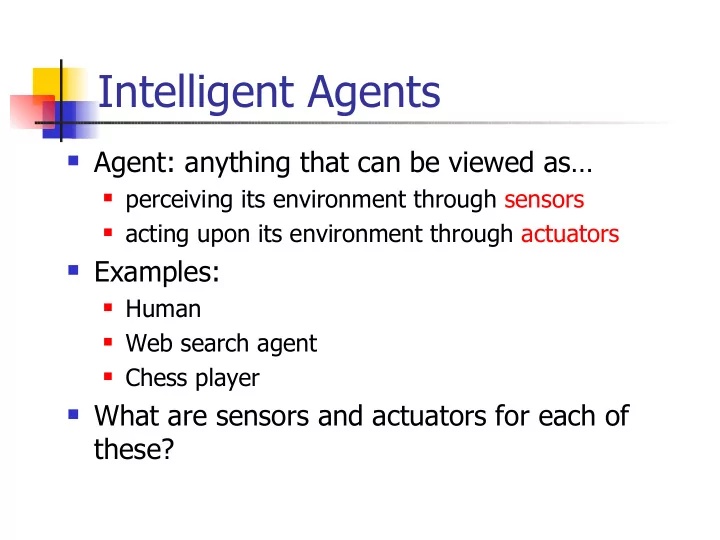

Intelligent Agents Agent: anything that can be viewed as… perceiving its environment through sensors acting upon its environment through actuators Examples: Human Web search agent Chess player What are sensors and actuators for each of these?
Rational Agents Conceptually: one that does the right thing Criteria: Performance measure Performance measures for Web search engine? Tic-tac-toe player? Chess player? When performance is measured plays a role short vs. long term
Rational Agents Omniscient agent Knows actual outcome of its actions What info would chess player need to be omniscient? Omniscience is (generally) impossible Rational agent should do right thing based on knowledge it has
Rational Agents What is rational depends on four things: Performance measure Percept sequence: everything agent has seen so far Knowledge agent has about environment Actions agent is capable of performing Rational Agent definition: Does whatever action is expected to maximize its performance measure, based on percept sequence and built-in knowledge
Autonomy “Independence” A system is autonomous if its behavior is determined by its percepts An alarm that goes off at a prespecified time is not autonomous An alarm that goes off when smoke is sensed is autonomous A system without autonomy lacks flexibility
The Task Environment An agent’s rationality depends on Performance Measure Environment Actuators Sensors What are each of these for: Chess Player? Web Search Tool? Matchmaker? Musical performer?
Environments: Fully Observable vs. Partially Observable Fully observable: agent’s sensors detect all aspects of environment relevant to deciding action Examples? Which is more desirable?
Environments: Determinstic vs. Stochastic Deterministic: next state of environment is completely determined by current state and agent actions Stochastic: uncertainty as to next state If environment is partially observable but deterministic, may appear stochastic If environment is determinstic except for actions of other agents, called strategic Agent’s point of view is the important one Examples? Which is more desirable?
Environments: Episodic vs. Sequential Episodic: Experience is divided into “episodes” of agent perceiving then acting. Action taken in one episode does not affect next one at all. Sequential typically means need to do lookahead Examples? Which is more desirable?
Environments: Static vs. Dynamic Dynamic: Environment can change while agent is thinking Static: Environment does not change while agent thinks Semidynamic: Environment does not change with time, but performance score does Examples? Which is more desirable?
Environments: Discrete vs. Continuous Discrete: Percepts and actions are distinct, clearly defined, and often limited in number Examples? Which is more desirable?
Environments: Single agent vs. multiagent What is distinction between environment and another agent? for something to be another agent, maximize a performance measure depending on your behavior Examples?
Structure of Intelligent Agents What does an agent program look like? Some extra Lisp: Persistence of state (static variables) Allows a function to keep track of a variable over repeated calls. Put functions inside a let block (let ((sum 0)) (defun myfun (x) (setf sum (+ sum x))) (defun report () sum) )
Generic Lisp Code for an Agent (let ((memory nil)) (defun skeleton-agent (percept) (setf memory (update-memory memory percept)) (setf action (choose-best-action memory)) (setf memory (update-memory memory action)) action ; return action ))
Table Lookup Agent In theory, can build a table mapping percept sequence to action Inputs: percept Outputs: action Static Variable: percepts, table
Lookup Table Agent (let ((percepts nil) (table ????) (defun table-lookup-agent (percept) (setf percepts (append (list percept) percepts)) (lookup percepts table)) ))
Specific Agent Example: Pathfinder (Mars Explorer) Performance Measure: Environment: Actuators: Sensors: Would table-driven work?
Four kinds of better agent programs Simple reflex agents Model-based reflex agents Goal-based agents Utility-based agents
Simple reflex agents Specific response to percepts, i.e. condition-action rule if new-boulder-in-sight then move-towards-new-boulder Advantages: Disadvantages:
Model-based reflex agents Maintain an internal state which is adjusted by each percept Internal state: looking for a new boulder, or rolling towards one Affects how Pathfinder will react when seeing a new boulder Can be used to handle partial observability by use of a model about the world Rule for action depends on both state and percept Different from reflex, which only depends on percept
Goal-Based Agents Agent continues to receive percepts and maintain state Agent also has a goal Makes decisions based on achieving goal Example Pathfinder goal: reach a boulder If pathfinder trips or gets stuck, can make decisions to reach goal
Utility-Based Agents Goals are not enough – need to know value of goal Is this a minor accomplishment, or a major one? Affects decision making – will take greater risks for more major goals Utility: numerical measurement of importance of a goal A utility-based agent will attempt to make the appropriate tradeoff
Recommend
More recommend